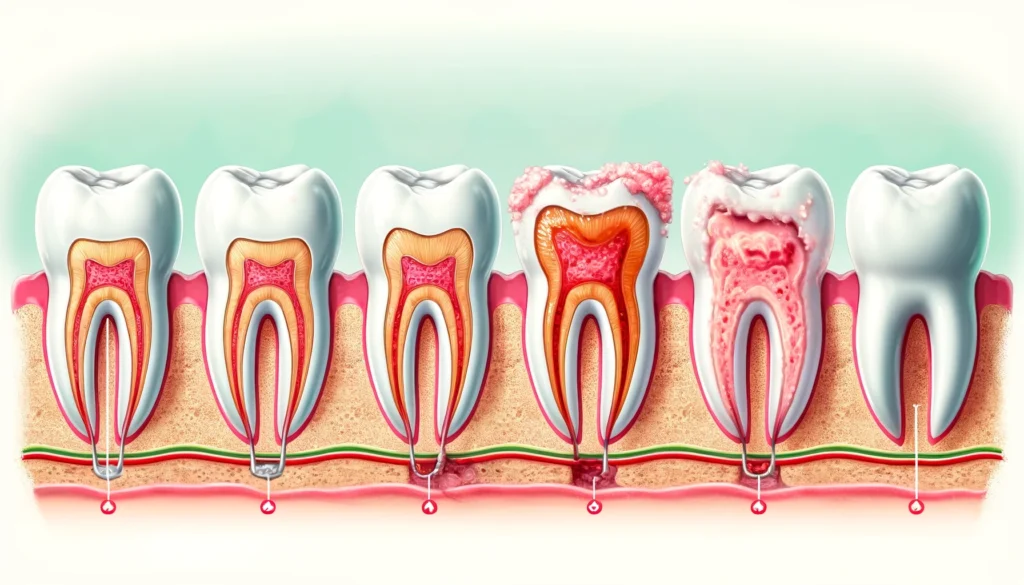Maintaining oral health is a fundamental aspect of overall well-being. Regular dental check-ups play an indispensable role in achieving this goal. Yet, many individuals need to pay more attention to the importance of these routine visits.
Neglecting dental check-ups can lead to severe issues and costly treatments. Regular visits catch problems early, prevent decay, and improve oral and overall health, ensuring a confident smile and well-being.
This article delves into why consistent dental check-ups are essential and how they contribute to dental and general health.
Early Detection of Dental Issues
- One of the primary benefits of regular dental check-ups is the early detection of potential dental problems.
Dentists are trained to identify issues such as cavities, gum disease, and oral cancer in their nascent stages. Early detection simplifies treatment and significantly reduces the risk of complications. For instance, a small cavity, if left untreated, can progress into a major issue requiring a root canal or even extraction. Similarly, early-stage gum disease can be managed effectively with non-surgical treatments, preventing severe periodontal issues down the line.
- In addition to cavities and gum disease, regular dental visits allow for the early identification of oral cancer, a condition that can be life-threatening if not caught early.
During a check-up, a dentist thoroughly examines the mouth, looking for signs of abnormal tissue changes, lesions, or growths that might indicate the presence of cancerous or precancerous conditions. Early detection of oral cancer dramatically increases the chances of successful treatment and survival.
- Moreover, routine dental exams can uncover less obvious issues such as jaw misalignment, impacted teeth, or temporomandibular joint (TMJ) disorders.
If detected early, these conditions can be managed or corrected before leading to more severe complications or chronic pain. For example, addressing a minor TMJ disorder early on can prevent it from developing into a debilitating condition that significantly impacts quality of life.
Regular dental check-ups also allow dentists to monitor the health of previous dental work, such as fillings, crowns, and implants. They can assess whether these restorations still function properly or need repair or replacement.
Prevention of Tooth Decay and Gum Disease
Preventative care is the cornerstone of dental health. Regular check-ups include professional cleanings that remove plaque and tartar buildup, which are not easily eliminated by regular brushing and flossing. This proactive approach helps prevent tooth decay and gum disease. Plaque, a sticky film of bacteria, continuously forms on teeth. If not removed, it hardens into tartar, which can only be cleaned by a dental professional. Regularly removing these substances keeps the teeth and gums healthy, reducing the likelihood of cavities and gingivitis.
Professional cleanings are crucial because they reach areas often missed during daily oral hygiene routines. Dentists and hygienists use specialized tools to clean around the gum line and between teeth, thoroughly removing plaque and tartar. In addition to cleanings, regular check-ups provide a platform for education on proper oral hygiene practices. Dentists can offer personalized advice on brushing techniques, flossing, and mouthwash to enhance daily dental care routines. They can also recommend fluoride treatments or dental sealants, which protect against decay, particularly in children and adolescents.
Preventative dental care extends beyond the teeth and gums to the oral environment. Dentists evaluate the mouth’s soft tissues, including the tongue, cheeks, and palate, for signs of infection, trauma, or other conditions that could impact oral health. They also assess the fit and function of dentures, bridges, and other dental appliances, ensuring they do not contribute to irritation or other issues.
Maintenance of Overall Oral Health
Routine dental visits also play a crucial role in maintaining overall oral health. Dentists provide personalized advice on oral hygiene practices, dietary recommendations, and other factors contributing to oral wellness.
Personalized Oral Hygiene Advice: Dentists provide individualized guidance on proper oral hygiene practices tailored to each patient’s needs, ensuring optimal care.
- Dietary Recommendations: Nutrition advice that supports dental health, such as reducing sugar intake and eating foods that strengthen teeth and gums.
- Brushing Techniques: Instructions on effective brushing methods to remove plaque and prevent decay, including using electric versus manual toothbrushes.
- Dental Products Guidance: Recommendations on the best dental products, such as fluoride toothpaste, mouthwash, and dental floss.
- Lifestyle Choices: Advice on lifestyle changes that impact oral health, such as quitting smoking and reducing alcohol consumption.
- Bruxism Management: Identify and treat bruxism (teeth grinding), which, if addressed early, can prevent significant damage to teeth and jaw joints.
Overall Oral Wellness: Continuous monitoring and maintenance of the health of teeth, gums, and soft tissues to prevent long-term issues.
Cosmetic Benefits of Regular Check-Ups
Beyond health, regular dental check-ups have significant cosmetic benefits. Professional cleanings can remove surface stains caused by foods, drinks, and tobacco, resulting in a brighter smile. Dentists can also provide treatments such as whitening and veneers to enhance the appearance of teeth. Furthermore, addressing issues like misalignment and gaps early on can prevent more extensive orthodontic therapies in the future. A healthy, attractive smile boosts self-confidence and contributes to a positive self-image.
In addition to basic cleaning and whitening, dentists can perform bonding procedures to repair chipped or cracked teeth, restoring their natural appearance. Regular check-ups also allow for the timely replacement of old, discolored fillings with tooth-colored materials, further enhancing a smile’s aesthetic appeal. Moreover, dentists can offer advice on lifestyle changes to maintain the cosmetic benefits of dental treatments, such as avoiding staining foods and beverages and practicing good oral hygiene.
The Role of Dental Check-Ups in General Health
The mouth is often called the gateway to the body, and its health is intricately linked to overall health. Regular dental check-ups can help in the early detection of systemic conditions such as diabetes, heart disease, and osteoporosis.
- Early Detection of Systemic Conditions: Routine dental exams can reveal signs of broader health issues, such as diabetes, heart disease, and osteoporosis.
- Symptom Identification: Dentists can detect symptoms indicative of systemic conditions, such as dry mouth or gum inflammation linked to diabetes.
- Referral for Further Evaluation: Dentists can recommend additional medical evaluations if they observe potential signs of systemic diseases.
- Reduction of Systemic Infections: Maintaining oral health through regular check-ups helps prevent systemic infections that can arise from oral bacteria entering the bloodstream.
- Chronic Condition Prevention: Good oral hygiene reduces the risk of chronic conditions like cardiovascular disease linked to periodontal health.
- Gateway to Overall Health: Since oral health is interconnected with overall health, maintaining it through regular dental visits supports general well-being.
Overcoming Common Barriers to Regular Dental Visits
Despite the clear benefits, many people avoid regular dental check-ups due to various barriers such as fear, cost, and lack of time. Addressing these obstacles is crucial for improving public oral health.
- Dental anxiety can be mitigated through techniques such as sedation dentistry and creating a comfortable environment.
- Dental insurance plans can alleviate financial concerns, and many dental practices offer payment options.
- Additionally, educating the public about the importance of oral health and making dental services more accessible can encourage more people to prioritize regular check-ups.
Conclusion
Regular dental check-ups are vital to maintaining oral and general health. They enable early detection and prevention of dental issues, contribute to oral hygiene, and provide significant cosmetic and health benefits. By understanding and overcoming the common barriers to regular dental visits, individuals can ensure they receive the comprehensive care needed to maintain a healthy smile and overall well-being. Prioritizing regular dental check-ups is an investment in long-term health and quality of life.

Dr. Orion Johnson is a dedicated and compassionate dentist committed to providing exceptional dental care to his patients.Dr. Johnson obtained his Doctor of Dental Surgery (DDS) degree from a prestigious dental school, where he excelled academically and clinically. He is licensed to practice dentistry and stays updated with the technology through continuing education and training.

